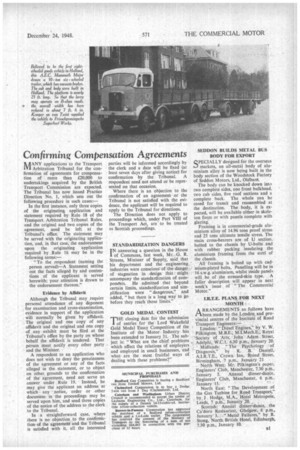Confirming Compensation Agreements
Page 35

If you've noticed an error in this article please click here to report it so we can fix it.
4ANY applications to the Transport
Arbitration Tribunal for the confirmation of agreements for compensation of more than E20,000 to undertakings acquired by the British Transport Commission are expected. The Tribunal has now issued Practice Direction No. I, which sets out the following procedure in such cases:—
In the first instance, only three copies of the originating application and statement required by Rule 18 of the Transport Arbitration Tribunal Rules, and the original and two copies of the agreement, need be left at the Tribunal's office. The statement may be served with the originating application, and, in that case, the endorsement upon the originating application required by Rule 16 may be in the following terms:— " To the respondent (naming the person served)—A Statement setting out the facts alleged by and contentions of the applicant is served herewith; your attention is drawn to the endorsement thereon."
Evidence by Affidavit Although the Tribunal may require personal attendance of any deponent for examination and cross-examination, evidence in support of the application will normally be given by affidavit. The original and one copy of any affidavit and the original and one copy of any exhibit must be filed at the Tribunal's office by the party on whose behalf the affidavit is tendered. That person must notify every other party and the Minister.
A respondent to an application who does not wish to deny the genuineness of the agreement or any of the facts alleged in the statement, or to object on other grounds to the confirmation of the agreement, need not serve an answer under Rule 19. Instead, he may give the applicant an address at which any *notice, order or other document in the proceedings may be served upon him, and send three copies of the notice of the address to the clerk to the Tribunal.
In a straightforward case, where there is no objection to the confirmation of the agreement and the Tribunal is satisfied with it, all the interested parties will be informed accordingly by the clerk and a date will be fixed (at least seven days after giving notice) for confirmation by the Tribunal. A respondent need not attend or be represented on that occasion.
Where there is an objection to the confirmation of an agreement or the Tribunal is not satisfied with the evidence, the applicant will be required to apply to the Tribunal for directions.
The Direction does not apply to proceedings which, under Part VIII of the Transport Act, are' to be treated as Scottish proceedings.
STANDARDIZATION DANGERS
IN answering a question in the House of Commons, last week, Mr. G. R. Strauss, Minister of Supply, said that his department and the engineering industries were conscious of the danger of stagnation in design that might accompany the standardization of components. He admitted that beyond certain limits, standardization and simplification were "dangerous," and added, "but there is a long way to go before they reach those limit."
GOLD MEDAL CONTEST
THE closing date for the submission of entries for the Lord Wakefield Gold Medal Essay Competition of the Institute of the Motor Industry has been extended to January 31. The subject is: "What are the chief problems which affect the relations of employers and employed in small businesses, and what are the most fruitful ways of dealing with these problems?"




















































































